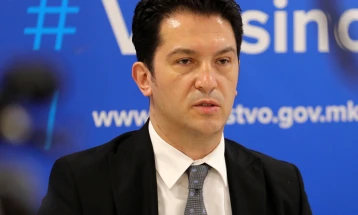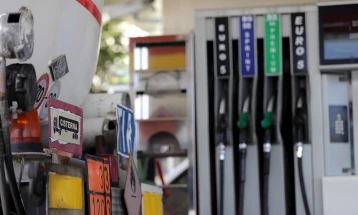Angeloska-Bezhoska - Stamnova: Establishing best European practices through Single Register of Accounts
- By implementing reforms through the adoption of new laws and regulations in the payment sector and in preventing money laundering and financing terrorism, our country has strengthened its path toward European integration. The establishment of the Single Register of Accounts is one of the key steps aimed at simplifying the processing of data for payment accounts, deposit accounts, and safes, which will lead to more efficient operations by institutions and provide greater protection for consumers. This was emphasized during the meeting between the Governor of the National Bank, Anita Angelovska-Bezhoska, and the Director of the Central Registry, Anita Stamnova, along with their teams.

Skopje, 15 December 2024 (MIA) - By implementing reforms through the adoption of new laws and regulations in the payment sector and in preventing money laundering and financing terrorism, our country has strengthened its path toward European integration. The establishment of the Single Register of Accounts is one of the key steps aimed at simplifying the processing of data for payment accounts, deposit accounts, and safes, which will lead to more efficient operations by institutions and provide greater protection for consumers. This was emphasized during the meeting between the Governor of the National Bank, Anita Angelovska-Bezhoska, and the Director of the Central Registry, Anita Stamnova, along with their teams.
According to the National Bank, it was highlighted during the meeting that the Single Register of Accounts will be a crucial foundation for efficient payment execution, improved financial control, and the prevention of illegal activities, following the best European practices.
“The Single Register of Accounts will enhance the efficiency of the payment system in the country. Through it, access to important data for institutions will be ensured, allowing them to perform their tasks more effectively. The National Bank, by utilizing the data from this register, will be able to improve the execution of supervisory tasks, as well as increase the security, stability, and efficiency of the country's payment system, all contributing to the stability of the nation's financial system,” Governor Angelovska-Bezhoska said.
She also added that the establishment of this register is significant for our country's integration into the Single Euro Payments Area (SEPA) and for ensuring the necessary regulatory and functional alignment, which is essential for our integration in the EU payment infrastructure.
“With the adoption of the new Law on Payment Systems and Payment Services, the Central Registry assumed the role of managing the Single Register of Accounts as the administrator of the register. In this context, the Central Registry will support the digital transformation of the payment services market by establishing a comprehensive database of accounts and safes, to which banks and new non-bank payment service providers will have access. They will be able to use this data to improve their solutions and systems for more efficient and secure payment processing by citizens and companies. Additionally, state institutions will be able to use the data from this register to more effectively perform their tasks. By implementing the requirements of relevant European Union regulations in the field of anti-money laundering and counter-terrorism financing, the project will contribute to maintaining the integrity of the financial system,” Stamnova said.
The creation of the Single Register of Accounts, as stated by the National Bank, is mandated by the Law on Payment Services and Payment Systems. This will meet one of the key requirements of the European Union’s Fifth Directive on combating money laundering and the financing of terrorism, establishing a strong legal foundation for integrating the country’s payment system into the EU’s payment infrastructure.
According to the National Bank, this will significantly enhance data exchange and cooperation, not just between domestic institutions, but also with other European Union countries. This cooperation is crucial for strengthening control over cross-border financial flows and improving the efficiency of processes aimed at preventing illegal activities, thus showing that our country is ready and making necessary progress toward modernizing and securing its financial system.
The meeting underscored the exchange of information and cooperation between the two institutions, with special attention given to the need for sharing the financial education practices implemented by the National Bank.
Photo: National Bank







